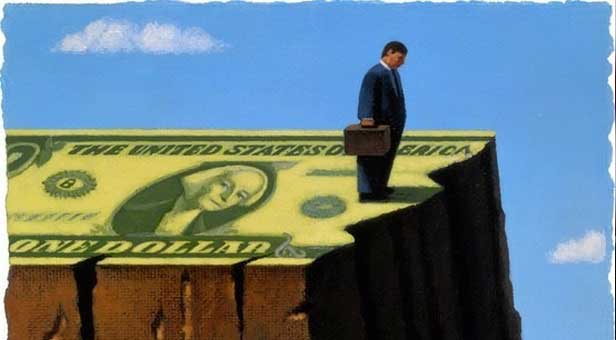

Fiscal cliff’ might push poor, Blacks over the edge
By Freddie Allen
WASHINGTON, D.C. (NNPA) — If Republicans and Democrats don’t reach a 12th hour deal to avoid the “fiscal cliff,” many lower-and middle-income families will feel deep pain, according to analysis by economists and respected think tanks.
The Budget Control Act, set to expire at the end of the year, will usher in draconian social spending and defense cuts along with tax hikes on all Americans if lawmakers can’t get a deal done. Much of the impact of such a decision –or non-decision – will come later in the year, some changes will be immediate.
“The most immediate one is the payroll tax,” said Chuck Marr, director of federal tax policy at the Center for Budget and Policy Priorities (CBPP), a fiscal policy and public program research group. “That’s going to come right out of your paycheck, your first one is going to change.”
In 2010, President Obama worked with Congress to continue the “payroll tax holiday” and unemployment insurance benefits.
In an October 2012 brief on the payroll tax cut and unemployment insurance extension, CBPP reported that both were still needed to spur growth in a fragile economy.
The brief stated: “If the payroll tax cut ends abruptly as scheduled on December 31, the paychecks of the average working family will shrink by roughly $1,000 over the course of 2013, putting downward pressure on consumer spending when the economy remains vulnerable.”
The CBPP brief listed a number of examples. A cashier making $20,230 saved $405 as a result of the payroll tax cut, a hair dresser who earned $26,460 saved $529 and an electrician who made $52,910 kept an additional $1,037. Those savings will disappear on New Year’s Day if a deal isn’t reached.
The report noted that the temporary pay roll tax cut could add $100 billion to the economy, twice what the upper-income tax cuts would contribute, “because much of the payroll tax cut goes to low- and middle-income households, whose spending rises more in response to increases in their income than does wealthier people’s.”
The brief also recommended extending unemployment insurance for another year to prop up the ailing economy. Even though, Blacks access the unemployment benefits at lower rates than Whites, more than one million Blacks received the help, softening the impact of a double-digit jobless rate (14.1 percent in October 2012) that plagues the Black community.
For many lower-income and middle-income Blacks, the Earned Income Tax Credit and the Child Tax Credit provided an additional safeguard against poverty.
In a June 2012 study, the CBPP reported that the special credit not only reduced poverty, but helped children succeed in school and increased their potential earnings as adults.
The report said: “Children in low-income families that received an annual income boost of $3,000 (in 2005 dollars) between the child’s prenatal year and fifth birthday earned an average of 17 percent more as adults, and worked 135 hours more annually, than similar children whose families do not receive the added income, according to research by Greg J. Duncan, Kathleen Ziol-Guest of Cornell University, and Ariel Kalil of the University of Chicago.”
Low and middle-income families would not immediately feel the sting of losing the Earned Income Tax Credit and the Child Tax Credit because they come into play when those families file taxes.
Significant cuts to the federal budget could also harm Blacks who depend on public sector jobs for employment.
According to a 2011 study titled “Black Workers and the Public Sector,” labor economist Steven Pitts found that, “the public sector is the single most important source of employment for African Americans.”
More than 21 percent of Blacks that held jobs from 2008-2010 were employed in the public sector.
“The public sector is also a critical source of decent-paying jobs for Black Americans. For both men and women, the median wage earned by Black employees is significantly higher in the public sector than in other industries,” wrote Pitts.
President Obama’s plan centers on extending unemployment benefits and the payroll tax cut. But Republicans are pushing reforms to Medicaid, Medicare and Social Security .
The Associated Press has reported that President Obama floated a plan to save unemployment insurance, the payroll tax cut and support for homeowners. Meanwhile, GOP lawmakers proposed increasing the eligibility age for Medicare and reducing Social Security and Medicaid payouts. Republicans also want to extend all of the Bush-era tax cuts, despite studies that showed that there were no significant benefits to the economy and job rate when the wealthiest Americans paid lower taxes.
Wilhelmina Leigh, a senior research associate at the Joint Center for Political and Economic Studies, an independent research group in Washington, D.C., said that uncertainty about the direction of the country’s economic policy is just as bad the specter of the fiscal cliff, because it becomes harder for businesses, domestic and abroad, and American families to plan for the future.
“You don’t know exactly where the shortfall will hit you,” said Leigh. “It’s going to show up in a lot little ways.”
As the clock ticks down to December 31, some lawmakers remain optimistic about a budget deal.
“I think we’re going to get this done, I’m more positive than most,” Senate Majority Whip Dick Durbin (D-Ill.) said recently during a presentation on proposed solutions to the fiscal cliff showdown at the Center for American Progress, a nonpartisan progressive think tank in Washington, D.C.
Durbin said that he didn’t know if there was a mandate that came out of this election, but there certainly was a work order.
He explained, “It said: ‘Get to work and do it together and get the job done.’”


Be the first to comment